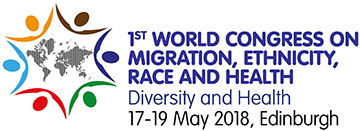In the 21st-century we are witnessing the rapid movement of people across continents and between countries with an acceleration towards the creation of multi-ethnic, multi-racial and multicultural societies. This has implications not just for those moving but for settled populations, and in particular indigenous minorities.
This phenomenon is bringing high-level opportunities and challenges, which deeply affect health in its broadest sense, healthcare systems and the delivery of health care to individuals. To meet these challenges requires ever increasing and deeper study of core concepts such as equality, equity, migration, ethnicity, race and how these concepts impinge on the achievement of good health and health-care in individuals and populations.
Scholarship, research and practice are developing rapidly in this field across the world but not in an internationally integrated, and unified way. There are considerable opportunities for learning across continents and countries. There have been several international Congresses dealing with this topic but mostly they have been within a continent e.g. we recently enjoyed the seventh such European meeting in Oslo, Norway, in 2016, organised under the auspices of the Migrant & Ethnic Health Section of the European Public Health Association. This Section has had a vision to augment the European meetings with an international one. To our knowledge, this planned Congress will be the first truly global Congress to focus on health and health-care in relation to Migration, Ethnicity, Race and Health.
We aim to organise a memorable, low-cost (subsidised) academic and social programme to provide an opportunity to bring together people from diverse organisations and disciplinary backgrounds to focus on common interests. In particular, we would like to see convergence of policy, social science, clinical, social service and public health perspectives to improve research, population health and health care. Above all we want to share and transfer learning within and across countries. We aim to engage the public both through the media and directly in our dialogue.
We aim to involve, directly, organisations involved in communicating issues to the public, in addition to the more usual use of mass media to publicise the discussions and conclusions of the Congress. This may well involve the inclusion of such organisations in the development programme.
We will examine contemporary problems across the globe, debate solutions, and forecast the future. We will consider diseases (including uncovering their causes); health effects of social, environmental and demographic change; and theoretical, conceptual and technical developments in the disciplines underpinning our work.
We aim to share the best of international research, scholarship and practice particularly to identify generalizable theories, principles and actions that hold across the world. Among other specific goals is to bridge differences in concepts and terminology so our field moves to adopting terminology that is acceptable and understood internationally. Prior to the Congress we will prepare a glossary of terms to be used (and improved) during our discourse.
The Congress will discuss setting up a Global Society for research and scholarship in the field of migration, ethnicity, race and health and social consequences, which would, amongst other tasks, take on the running of this World Congress on a regular basis, perhaps three-yearly. This idea will be considered informally and developed prior to the Congress. During the Congress, we will hold a workshop to take it forward. The first formal meeting of such an organisation will take place during the Congress.
Our aim is to give an opportunity for people working in the field not only to showcase their work but also to meet to share experience and motivations. We would hope that people from a range of disciplines will get to know each other and build networks that will last beyond the Congress itself.
